|
|
|
Sort Order |
|
|
|
Items / Page
|
|
|
|
|
|
|
| Srl | Item |
| 1 |
ID:
169787


|
|
|
|
|
| Summary/Abstract |
Research into what has been alternatively identified as (transnational) communities, elites, or networks has a long history in social sciences.1 This scholarship offers various entry points emphasising economic, political, as well as sociocultural analytical dimensions, not to mention historical and spatial ones. Therefore, when investigating the dynamics of formation, maintenance, and decline of social aggregates (e.g. business associations, policy-planning groups, or epistemic communities), the question of how to move beyond disciplinary divides and build a post/interdisciplinary analytical framework inevitably arises. Yet, bridging these various dimensions in a ‘socio-political economy of the globe’ (see the ‘Introduction’ of this forum) is not without major theoretical and methodological challenges when it comes to business associations.
|
|
|
|
|
|
|
|
|
|
|
|
|
|
|
|
| 2 |
ID:
169781
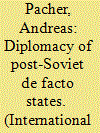

|
|
|
|
|
| Summary/Abstract |
Why do post-Soviet de facto states (such as Abkhazia and South Ossetia) regularly interact with remote Pacific islands or Latin American countries, even though they are not bound by any meaningful political, economic or military ties? This article argues that the diplomatic relationship management amounts to a strategy of external legitimacy-building through stigma rejection and ontological security-attainment. This diplomatic practice creates positively tinged social affiliations, whereby the unrecognized entities aim to have their identity as ‘normal’ states affirmed. It renders the international society’s stigma ineffective, thus facilitating a potential exit from the stigma. By illuminating the performative aspects behind the de facto states’ quest for recognition, this article uncovers the de facto states’ agency and analytically emancipates them from the structural factor of ‘Russia-as-a-great-power’. It also contributes to the literature of ontological security by highlighting how positive (rather than conflictual) relationships, and how transformed (rather than stable) identities can be conducive to its attainment. This article generally highlights the need to analyse de facto states’ foreign relations more holistically than previously done.
|
|
|
|
|
|
|
|
|
|
|
|
|
|
|
|
| 3 |
ID:
169783
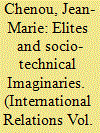

|
|
|
|
|
| Summary/Abstract |
In an ongoing debate between International Political Economy (IPE) and International Political Sociology (IPS), the question of technology provides an important entry point. For a number of decades, oil posed both security and economic issues. Today, we find ourselves at a point where information is about to replace oil as the most valuable resource. Whereas dominant (liberal) accounts of current technological transformations insist on the democratising potential of Information and Communication Technologies (ICTs), both IPE and IPS scholarships can contribute to critically analyse power relations in the digital age.
|
|
|
|
|
|
|
|
|
|
|
|
|
|
|
|
| 4 |
ID:
169785
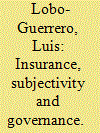

|
|
|
|
|
| Summary/Abstract |
Insurance, an industry worth 4.6 trillion USD in premium volume in 2016,1 has major effects on how individuals and collectives are governed in the world. With 80 per cent of premiums sold in OECD countries, it is reasonable to argue that the form of governance it facilitates is premised on the liberal forms of life that insurance has been designed to protect.2 If, as argued in the ‘Introduction’, doing a socio-political economy of the globe is indeed possible, the problem of understanding the role of insurance in creating liberal governance in the world, and the possibility of questioning and resisting this process, is certainly an important challenge. This can only be done, as posed by the forum, by integrating the analysis of the political, the economic and the sociocultural, of the everyday and the global, as a single problem space where an integration between IPE and IPS has much to offer. This contribution to the forum focuses on identifying empirical spaces where IPE meets IPS in the problem that results from insurantial practices of governing through risk.
|
|
|
|
|
|
|
|
|
|
|
|
|
|
|
|
| 5 |
ID:
169780


|
|
|
|
|
| Summary/Abstract |
Traditionally, states were widely believed to be the only institutions claiming political authority. More recently, though, a number of authors have argued that we find various instances of political authority on the international level. We discuss three prominent proposals for conceptualizing international authority: Michael Barnett and Martha Finnemore’s account of the authority of international bureaucracies, David Lake’s extension of ‘relational’ authority to the international realm, and Michael Zürn’s recent proposal for ‘reflexive’ authority. These authors provide a nuanced and empirically rich picture of hitherto mostly overlooked forms of power in world politics. Yet, we argue that in doing so they lose sight of the distinctly normative character of political authority relations: these relations are built on the explicit normative claim to the right to rule. When such a claim is considered to be justified, authority relations generate content-independent reasons for compliance. Thus understood, authority serves an important function, namely, to facilitate broadly accepted and normatively justified forms of hierarchical coordination. From a normative perspective, therefore, broadening the concept of authority to include various other forms of power deprives us of a critical yardstick against which international organizations should be evaluated. Moreover, it creates a distorted picture of the scope of international authority. Our world is shaped by highly problematic power relations. Yet, in order to meet current challenges of global governance, we need more, not less authority. To illustrate this argument we examine the case of the World Bank, an organization that exercises considerable power while explicitly avoiding any claim to political authority.
|
|
|
|
|
|
|
|
|
|
|
|
|
|
|
|
| 6 |
ID:
169782
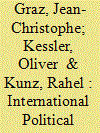

|
|
|
|
|
| Summary/Abstract |
This forum opens a debate that is long overdue: for far too long, the fields of international political sociology (IPS) and international political economy (IPE) have been standing apart. Discussions take place in different conference sections, in different networks that publish in different journals. Yet, this divide is surprising given that the two fields share similar trajectories, theoretical concerns, problématiques, and conceptual challenges. This forum starts exploring this shared terrain: we believe that there is no a priori reason to separate the sociocultural, the political and the economic when we aim at making sense of the world in any meaningful way. We propose that bridging the IPE-IPS divide has tremendous potential for the development of a socio-political economy analysis that, we believe, has two benefits. First, it allows for the opening of new empirical terrains or deepening and widening existing ones. Second, bringing IPE/S back together creates reflexive spaces for more holistic, embodied and contextualised conceptual innovation. The contributors to this forum show each in their own way such empirical and conceptual added value of moving beyond the IPE and IPS divide in order to develop what we call here a socio-political economy of the globe. They focus on various issues, such as the transformation of capitalism from an oil- to a data-dependent accumulation regime with the rising of the so-called ‘digital age’ (Chenou); the profound social, economic and political transformation triggered by urbanisation in the development world (Elias, Rethel and Tilley); emerging global risks and the neglected role of the insurance industry (Lobo-Guerrero); regional development-security nexuses (Lopez Lucia); and business power in climate change diplomacy (Moussu).
|
|
|
|
|
|
|
|
|
|
|
|
|
|
|
|
| 7 |
ID:
169784
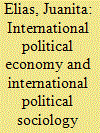

|
|
|
|
|
| Summary/Abstract |
Feminist International Political Economy (IPE), with its focus on the gendered dimensions of social reproduction and market life, provides ground for fruitful engagements between IPE and IPS. Indeed, from this perspective, the boundaries between IPE and IPS are much more porous than assumed in some other contributions to this forum. Pushing against the boundaries of narrowly demarcated disciplinary divides is something that feminist political economists have been actively engaged in since the early days. Our approach is one in which we call for a simultaneous recognition of both the ‘International’ and the ‘Everyday’ in research agendas, speaking as much to new research directions in the field of IPE as to writings in IPS. To illustrate our claim, this short piece reflects on a recent research project into the gendered everyday political economy of housing resettlement schemes in Jakarta, Indonesia – pointing to the interrelationships between everyday gendered practices of work, finance and caring, and how these relationships come to be transformed within the context of the global city. Such an intervention, we hope, points to the significant insights that a feminist lens brings to the development of an ever more sociologically informed international studies.
|
|
|
|
|
|
|
|
|
|
|
|
|
|
|
|
| 8 |
ID:
169779
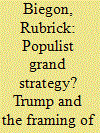

|
|
|
|
|
| Summary/Abstract |
What is the role of ‘populism’ in Donald Trump’s foreign policy? Defining populism as a framing style that constructs antagonisms around ‘the people’ and their adversaries, this article explores Trump’s rhetoric in relation to his efforts to shift US grand strategy away from its traditional investment in the liberal international order. Based on an approach grounded in the ontological commitments of critical discourse analysis, it examines three interlocking frames: (1) the ‘corrupt’ elites of the establishment ‘swamp’; (2) the anti-globalist, ‘America first’ agenda; and (3) poor deal-making responsible for the United States ‘losing’ in international affairs. In responding to declinist themes and anxieties, Trump’s populist rhetoric frames a Jacksonian ideological approach based on nationalism, mercantilism and a reliance on coercive power.
|
|
|
|
|
|
|
|
|
|
|
|
|
|
|
|
| 9 |
ID:
169786


|
|
|
|
|
| Summary/Abstract |
Regionalism1 projects are major sites of governance, cooperation, and conflicts today. Beyond trade agreements, they also concern development, security and political issues. Some projects have developed what scholars call a high level of ‘regionness’, an agency to act on, and influence world politics as autonomous actors.2 This development of ‘regionness’ is significant in two main ways. At the global level, as regionalism interacts with processes of globalisation, it emerges from region-builders’ multiple strategies to mediate, shape, profit, or shield themselves from globalisation. At the national level, ‘regionness’ is also a process of state transformation through which coalitions of actors relocate ‘the governance of particular issues beyond the scope of national governance and politics’.3 Regionalism has thus become a major form of political rule in international politics, and studying interactions that occur both within and between regions, as well as between regions and the international system is crucial to understand how the world works today.
|
|
|
|
|
|
|
|
|
|
|
|
|
|
|
|
|
|
|
|
|